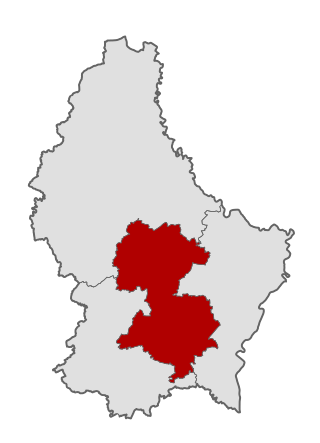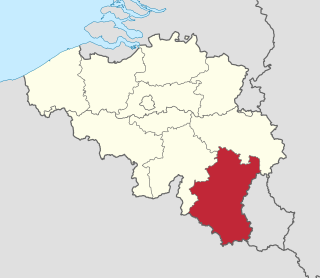 |
|---|
General elections were held in Luxembourg on 14 June 1854, electing members of the Chamber of Deputies from all the cantons of Luxembourg. [1] [2]
 |
|---|
General elections were held in Luxembourg on 14 June 1854, electing members of the Chamber of Deputies from all the cantons of Luxembourg. [1] [2]
The elections were held in the entire country. Partial general elections had already been due to happen in 1854; under the electoral system at the time, Deputies were elected to six-year terms, with elections held every three years, renewing half the Chamber's membership at a time. The last partial general election was in 1851.
On 15 May 1854 however, the Simons government prematurely dissolved the Chamber, and organised elections to renew its entire membership for 14 June. This dissolution was due to conflict between the executive and the legislature. [3]
Successful candidates are marked in bold
| Canton | Seats | Candidate | First round | Second round |
|---|---|---|---|---|
| Votes | Votes | |||
| Luxembourg | Eugène Fischer [a] | 1105 | ||
| Théodore Pescatore [a] | 1088 | |||
| Dominique Stiff [a] | 1013 | |||
| Augustin Lampach [a] | 971 | |||
| Michel Jonas [a] | 940 | |||
| Norbert Metz [a] | 835 | |||
| Édouard Aschmann [a] | 779 | |||
| Auguste Fischer [a] | 745 | |||
| Mathias Hertert [a] | 686 | |||
| Valentin Wahl [a] | 676 | |||
| Turnout | 1200 | |||
| Diekirch | Joseph Tschiederer | |||
| Jean Juttel | ||||
| Chrétien Mersch | ||||
| Charles Faber | ||||
| Jean Angelsberg | ||||
| Ulrich | ||||
| Turnout | - | |||
| Echternach | Michel Witry | |||
| Jean-Pierre Föhr | ||||
| Nicolas Arendt | ||||
| Mathias Hardt | ||||
| Turnout | - | |||
| Grevenmacher | Antoine Pescatore | |||
| Mathias Wawer | ||||
| Jean-Pierre Klein | ||||
| Pierre Müller-Walse | ||||
| Joseph Ritter | ||||
| Auguste Metz | ||||
| Schorn | ||||
| Knaff | ||||
| Turnout | ||||
| Remich | Gustave Lessel | |||
| Willibrord Macher | ||||
| Joseph-Chrétien Gretsch | ||||
| Jacques Diederich | ||||
| Turnout | ||||
| Wiltz | Charles Mathieu | |||
| Jacques Bernard | ||||
| Michel Frères | ||||
| Édouard Thilges | ||||
| Michel Fallis | ||||
| Turnout | ||||
| Clervaux | Jean-Pierre Toutsch | |||
| Lucien Richard | ||||
| Bernard Neumann | ||||
| Charles-Gérard Eyschen | ||||
| Turnout | ||||
| Esch-sur-Alzette | Victor de Tornaco | |||
| Auguste Collart | ||||
| Théodore De Wacquant | ||||
| Nicolas Schmit | ||||
| Jean Steichen | ||||
| Graas | ||||
| Hemmer | ||||
| Turnout | ||||
| Mersch | Michel Clément | |||
| Henri Witry | ||||
| Jean-Pierre Hoffmann | ||||
| Jean-Pierre Heuardt | ||||
| Turnout | ||||
| Redange | Nicolas Schröder | |||
| Rénilde-Guillaume Jacques | ||||
| Charles Bassing | ||||
| Nicolas Hippert | ||||
| Turnout | ||||
| Capellen | Charles Collart [a] | |||
| Jean-Baptiste-Henri-Melchior Funck [a] | ||||
| Jean-Guillaume Kremer [a] | ||||
| Dominique Elter [b] | ||||
| Thibesart | ||||
| Turnout | ||||
| Vianden | Jean Daleyden | |||
| Turnout | ||||
In Luxembourg canton, the entire list of candidates supported by the democratic-liberal anti-Simons Courrier du Grand-Duché de Luxembourg was elected with a large majority; in Mersch, 3 of the 4 successful candidates were on the Courrier's list. [2]
Notwithstanding the results in these two cantons, the elections were generally seen as a win for the pro-Simons government, reactionary side, over those supporting the 1848 Constitution and democratic rights; the Courrier stated "in several cantons, the reactionary candidates prevailed over the constitutional candidates and the old majority is seriously affected." [4] The Chamber could now be expected to support the government. [2]
Luxembourg is a parliamentary representative democratic monarchy, whereby the prime minister is the head of government, and the multi-party system. Executive power is under the constitution of 1868, as amended, exercised by the government, by the grand duke and the Council of Government (cabinet), which consists of a prime minister and several other ministers. Usually, the prime minister is the leader of the political party or coalition of parties having the most seats in parliament. Legislative power is vested in both the government and parliament. The judiciary is independent of the executive and the legislature.

South is one of the four multi-member constituencies of the Chamber of Deputies, the national legislature of Luxembourg. The constituency was established in 1919 following the introduction of proportional representation for elections to the Chamber of Deputies. It consists of the cantons of Capellen and Esch-sur-Alzette. The constituency currently elects 23 of the 60 members of the Chamber of Deputies using the open party-list proportional representation electoral system. At the 2023 general election it had 111,884 registered electors.

East is one of the four multi-member constituencies of the Chamber of Deputies, the national legislature of Luxembourg. The constituency was established in 1919 following the introduction of proportional representation for elections to the Chamber of Deputies. It consists of the cantons of Echternach, Grevenmacher and Remich. The constituency currently elects seven of the 60 members of the Chamber of Deputies using the open party-list proportional representation electoral system. At the 2023 general election it had 40,246 registered electors.

North is one of the four multi-member constituencies of the Chamber of Deputies, the national legislature of Luxembourg. The constituency was established in 1919 following the introduction of proportional representation for elections to the Chamber of Deputies. It consists of the cantons of Clervaux, Diekirch, Redange, Vianden and Wiltz. The constituency currently elects nine of the 60 members of the Chamber of Deputies using the open party-list proportional representation electoral system. At the 2023 general election it had 52,922 registered electors.

Centre is one of the four multi-member constituencies of the Chamber of Deputies, the national legislature of Luxembourg. The constituency was established in 1919 following the introduction of proportional representation for elections to the Chamber of Deputies. It consists of the cantons of Luxembourg and Mersch. The constituency currently elects 21 of the 60 members of the Chamber of Deputies using the open party-list proportional representation electoral system. At the 2023 general election it had 81,687 registered electors.

Jean Ulveling was a Luxembourgian statesman, politician, and historian. He served as a member of the Council of State of Luxembourg for some years, and was a member of the Constituent Assembly which framed a new constitution in 1848. From 1854 to 1856 he represented the canton of Wiltz in the Chamber of Deputies.
The Simons Ministry was in office in Luxembourg from 23 September 1853 to 26 September 1860. Initially it just consisted of three members of the government, to which two more were added on 23 September 1854.

The Willmar Ministry was in office in Luxembourg from 2 December 1848 to 23 September 1853.

Luxembourg is one of the 11 multi-member constituencies of the Chamber of Representatives, the lower house of the Belgian Federal Parliament, the national legislature of Belgium. The constituency was established as Arlon-Marche-Bastogne-Neufchâteau-Virton in 1995 following the fourth Belgian state reform. It was renamed Luxembourg in 2003 following the re-organisation of constituencies across Belgium along provincial lines. It is conterminous with the province of Luxembourg. The constituency currently elects four of the 150 members of the Chamber of Representatives using the open party-list proportional representation electoral system. At the 2019 federal election the constituency had 212,441 registered electors.
Partial general elections were held in Luxembourg on Thursday 17 September 1857, electing members of the Assembly of Estates.
Partial general elections were held in Luxembourg on 10 June 1851, electing members of the Chamber of Deputies.
Partial general elections were held in Luxembourg on 30 July 1860, electing 15 members of the Assembly of Estates. The elections took place in Echternach, Esch-sur-Alzette, Grevenmacher, Luxembourg-Campagne, Mersch, Redange, Remich, and Wiltz.
Partial general elections were held in Luxembourg on 14 June 1881, electing members of the Chamber of Deputies. The elections took place in Capellen, Clervaux, Diekirch, Esch-sur-Alzette, Grevenmacher, Luxembourg-Ville, Redange, and Vianden.
Partial general elections were held in Luxembourg on 11 June 1878, electing members of the Chamber of Deputies. The elections took place in Echternach, Esch-sur-Alzette, Luxembourg-Campagne, Mersch, Remich, and Wiltz.
Partial general elections were held in Luxembourg on 9 June 1875, electing members of the Chamber of Deputies. The elections took place in Capellen, Clervaux, Diekirch, Grevenmacher, Luxembourg City, Redange, and Vianden.
Partial general elections were held in Luxembourg on 8 June 1869, electing 20 members of the Chamber of Deputies. The elections took place in Capellen, Clervaux, Diekirch, Grevenmacher, Luxembourg City, Redange, and Vianden.
Partial general elections were held in Luxembourg on 12 June 1866, electing members of the Assembly of Estates. The elections took place in Luxembourg-Campagne, Esch-sur-Alzette, Echternach, Mersch, Remich, and Wiltz.
Partial general elections were held in Luxembourg on 9 June 1863, electing members of the Assembly of Estates. The elections took place in Luxembourg-City, Capellen, Diekirch, Grevenmacher, Redange, Clervaux, and Vianden.
Partial general elections were held in Luxembourg on 17 December 1868, electing members of the Chamber of Deputies. The elections took place in Capellen, Clervaux, Diekirch, Echternach, Luxembourg-Campagne, Mersch, Redange, Remich.
Partial general elections were held in Luxembourg in May 1845, electing members of the Assembly of Estates.